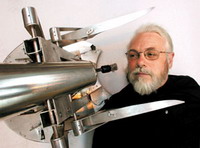British experts reject report raising issue of human rights for robots

Experts on Tuesday criticized a government-commissioned report that said calls could be made to grant intelligent machines human rights. Meanwhile British scientists are calling for a public discussion on the increasing use of robots.
"If artificial intelligence is achieved and widely deployed (or if they can reproduce and improve themselves) calls may be made for human rights to be extended to robots," said the report issued last year by the Office of Science and Innovation.
Experts on robotics say the report is a distraction from the real issue of how robots are being integrated into modern life. On Tuesday night, they are to hold a discussion open to the public in an effort to raise awareness of robotics and find out how people want the machines to be used.
The report was a collection of papers from futurist researchers looking at trends in health, technology and science. Of these, one addressed the issue of robot rights.
While the technology to produce intelligent machines is accelerating, experts still believe it is premature to discuss robot rights.
"We are not there yet," said Owen Holland, a professor of computer science at the University of Essex. "We have no time scale for what can be done in robotics."
Researchers doubt that intelligent robots could be created in the near future.
"The idea of machine consciousness is a bit of a fairy tale," said Professor Noel Sharkey, a computer science expert at the University of Sheffield. "Discussing robot rights now is very premature."
Like all technologies, the problem with robotics lies in its applications.
"We can imagine lots of frightening scenarios," Sharkey said, adding that it is up to the public to decide how robots should be employed. "If they are used properly, robots will ultimately benefit mankind."
Robots are already a part of everyday life, from vacuum cleaners that clean rooms on their own to autopilots that fly airplanes. More sophisticated robots are also being employed by the British military, which uses remote-controlled robots to destroy bombs, among other functions.
Britain lags behind other countries in its robot use. Japan in particular has embraced robots, and has even developed some capable of taking care of the elderly. Researchers there have created a five-foot (1.52 meter) tall robot that cannot only see, hear and smell, but that can carry up to 70 kilograms (155 pounds) in weight.
In the United States, Congress declared six years ago that it wanted one third of its military robots to be autonomous by 2015. Robots are currently used by the army to navigate independently in desert terrain, and researchers are now investigating whether they could also do so in urban areas.
Last year in South Korea, scientists produced an armed robot guard with the capacity to kill. South Korean officials proposed that robots equipped with guns patrol the border with North Korea.
Subscribe to Pravda.Ru Telegram channel, Facebook, RSS!


